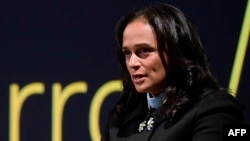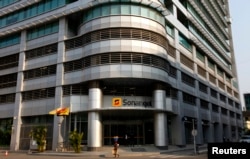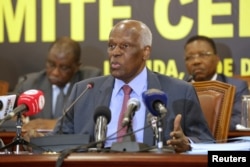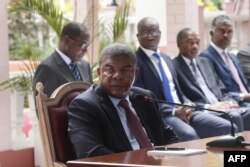Angola’s new president, Joao Lourenco, swept into power last year on a wave of promised reforms, both to the nation’s ailing economy and to the system of power and patronage built during decades of rule by President Jose Eduardo dos Santos.
But that tide of change may have hit some snags, analysts say, amid recent corruption allegations, accusations of uneven prosecutions and vocal pushback from the former ruling family.
In December, Lourenco removed Isabel dos Santos, the eldest daughter of the former president, from her post at the head of the nation’s oil company.
Last week, the new chairman of the oil company, Carlos Saturnino, reported that an internal audit unearthed a questionable $38 million transaction to a Dubai-based company.
That allegation of impropriety prompted dos Santos, who is Africa’s richest woman with an estimated worth of $2.6 billion, to fire back with a 13-page statement denouncing the "slanderous" and "defamatory campaigns" against her and saying the transaction was “totally legitimate.”
Smooth transition?
That tension, says Alex Vines, head of the Africa program for research group Chatham House, could imperil hopes of radical change in the oil-rich but debt-ridden nation, which desperately needs to entice foreign investment.
“What looked as if it was a fairly well-organized, smooth transition from the dos Santos era to the Lourenco era looks a little more frayed now and a little more challenged now with the difficulties that are emerging related to the pushing back of dos Santos business interests and allegations of corruption and impropriety during the dos Santos era, particularly by some family members,” he told VOA.
Vines predicts that Lourenco’s public moves against the two eldest dos Santos children — in January, he sacked Jose Filomeno dos Santos from his post as head of the nation’s $5 billion dollar sovereign wealth fund — could prompt the aging former president to dig in his heels.
Jose Eduardo dos Santos remains head of the ruling party, the People's Movement for the Liberation of Angola, a position from which he continues to hold power over Lourenco.
“The dos Santos family accepted that there would be change,” he said. "What nobody expected was the push for change to be as quick as it has been subsequent to the election and swearing-in of President Lourenco.... And what’s most surprising, because this is a process that is still in its infancy, is that there have been efforts to suggest that there will be an investigation of impropriety.”
Has anything really changed?
Some critics of the government say little has really changed in Angola.
This week, prominent human rights activist and journalist Rafael Marques de Morais appeared in a Luanda court over charges relating to a 2016 story he wrote alleging corrupt acts by the nation’s former attorney-general.
Marques has been a fixture in Angolan courts since he first faced trial for a 1999 article in which he accused then-president dos Santos of promoting “incompetence, embezzlement and corruption as political and social values." He was found guilty of “abuse of the press” and given a stiff fine.
Marques’ most recent case was postponed indefinitely, but the Committee to Protect Journalists appealed to President Lourenco to show greater commitment to eliminating corruption.
Lourenco has declared his government has a zero-tolerance policy toward corruption, CPJ executive director Joel Simon said in a statement. “However, journalists that have helped expose corruption in Angola have faced criminal charges in reprisal for their muckraking.”
Marques’ anti-corruption website, Maka Angola, said in a scathing recent editorial that the nation’s justice system remains unchanged — a serious impediment if Lourenco wishes to truly prosecute corruption.
“The justice system in Angola... has been so arbitrary that it punishes the disadvantaged at random and regularly produces authentic judicial antics,” the editorial reads “… As long as the Angolan judges do not respect the law and the citizens, a thousand speeches of Joao Lourenco are worthless.”












